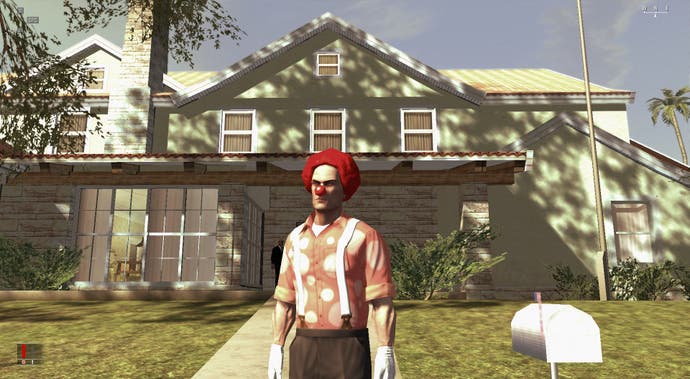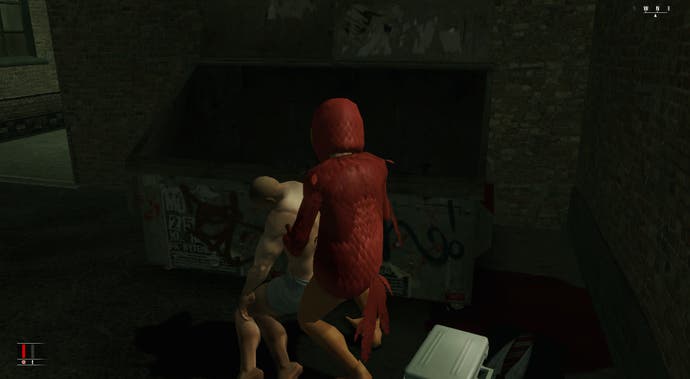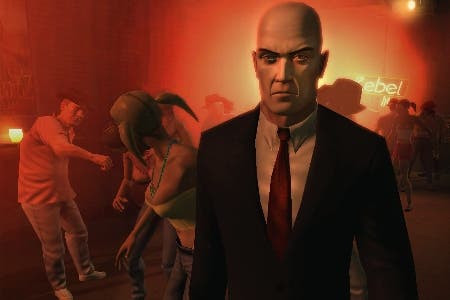Hitman: Blood Money retrospective
Through the eyes of a killer.
It's a murder simulator, right? IO is, quite literally, simulating murder, albeit of the professional variety. But Agent 47 isn't some kind-faced Jean Reno with a plucky Natalie Portman by his side. There are no redeeming features to the bald, bar-coded clone, and yet we still thrill to be placed a few feet behind his head. Disguising, strangling, sneaking and blasting our way through mostly civilian locations to kill whoever has the bounty on their head, along with a sizable handful of their personal entourage.
It should be vile. It kind of is. But it's also absurd, and that takes the edge off. Without Mardi Gras, with its giant colourful crow outfits, or the Heaven and Hell club, where everyone wears horrifically over-styled angel and demon masks, it might cut a little too close to the bone. But Hitman's world is not ours, and that's IO's smartest move.
The first two Hitman games alienated you with language, placing you in locales that took English away from you and left the majority of the NPCs as foreign nationals. It takes away a good deal of empathy when you can't understand what someone is saying, but it's never going to make you dislike someone. Blood Money was the game that made you actively want to end the lives of almost everyone you come across.
The women are hyper-sexualised, with tiny little waists and swollen chests, just as the men are riddled with bulging muscles and even more repulsive veins wrapping around their arms and necks like vines. Even more than this, the conversations are, at best, vapid. During the tutorial you overhear a conversation between a goon and a receptionist, and the obsession with sex and other such baser indulgencies is enough to make you feel like you might well be doing humanity a favour when you eventually push the goon over a railing to his death.
It wouldn't be a huge stretch to assume that this has more to do with 47 than it does with IO trying to make you feel better. The hero of the Hitman series has never had all that much characterisation, but with Blood Money all the information is external to him. This is how he sees the world; full of muscle bound alpha males and simpering bimbos. Anyone over the age of 30 is pot-bellied and balding. The world he perceives is an ugly one, and remorse isn't an emotion he's particularly familiar with.

All of this is without mentioning the briefing before every level that goes a way to selling you on why these particular men and women deserve to be eradicated. It's still murder, but it takes the edge off. And when the majority of the slayings are indirect, you're another degree removed. Falling chandeliers, swapped prop guns, explosives, accidents; you only have to get your hands dirty so many times, and there's almost always a more elegant solution.
Which is why all of this exists. You're taken away from the brutality of what you're doing because, at its heart, Hitman has always been an exquisite puzzle game. You're given a problem, and it's up to you to discover a solution. That solution is almost always murder, but it's how you get to it that makes the games so compelling. Blood Money was the best of them, providing huge arenas to wander around before you even consider slipping out the steel-wire and segregating air from lungs.
In a world where the vast majority of games are all about pumping you full of adrenaline and having you run and gun from one end of a corridor to another Blood Money's levels feel positively relaxing, giving you room to breathe and think rather than having claustrophobic gunfire rain down on you until you're just a set of reactions and a trigger finger.
That there are so many options, too, that it only encourages you to spend more time planning than executing. Will you kill the foreign dignitary with the sniper rifle from the rafters of the Opera House, or try to lure him down into the stalls, so you can blow the chandelier and have him crushed. They'll never even know you were there.
Even here, you're slipping into 47's head. IO achieved something few developers have really attempted, before or since, by having the mechanics of the game along with the environments, the character design, the dialogue, all push you further and further into occupying the same mental space as their protagonist. A protagonist which, it has to be said, isn't exactly the most sympathetic that video games have produced.
It's something that Blood Money reinforces as you get further into the game. Briefings subtly change to focus more on entryways and exploitable weaknesses, rather than trying to sell you on the kill. The Swing King of the tutorial deserves to die because he had a reckless disregard for basic health and safety, resulting in the death of multiple children. But later on they're just generic members of the criminal fraternity; it doesn't matter what they've done, just that they must die. In one of the few levels where the objective is rescue rather than assassination, you're given the optional objective of wiping out an entire trio of Mafia bosses just for a larger payday.
"This is how he sees the world; full of muscle bound alpha males and simpering bimbos. Anyone over the age of 30 is pot-bellied and balding."

Ignoring the few story-centric missions due to the convoluted and confusing nature of the plot, you're lead into thinking about the things 47 needs to be thinking about. How to get in, how to get a good clean kill, and how to get out.
It's not saying professional murder is ok, by any means. But it's a simulation, and the things you're killing really aren't even remotely human. It's even a game that encourages you to experiment, attempting a kill like this, or a kill like that, reloading whenever it doesn't go quite your way. Everyone dead returns, as if nothing had happened, and you kill them all over again. They're puzzle pieces, and you're figuring out the perfect solution. I'm pretty sure 47 could sympathise.
Returning to Blood Money this week, that's what stood out to me most. It's still a sublime game, with each level designed as this perfect puzzle for you to play around with. The AI is still impressive in its simple-minded obstruction of your movements, and trying to figure out how to get your sniper-rifle case past security without them wanting to peek inside is still a thrilling challenge. But the job IO Interactive did in creating a world that was so specifically tailored to selling you on 47's perspective, from the things people say to the way that you play the game, is perhaps the most impressive feat.
















